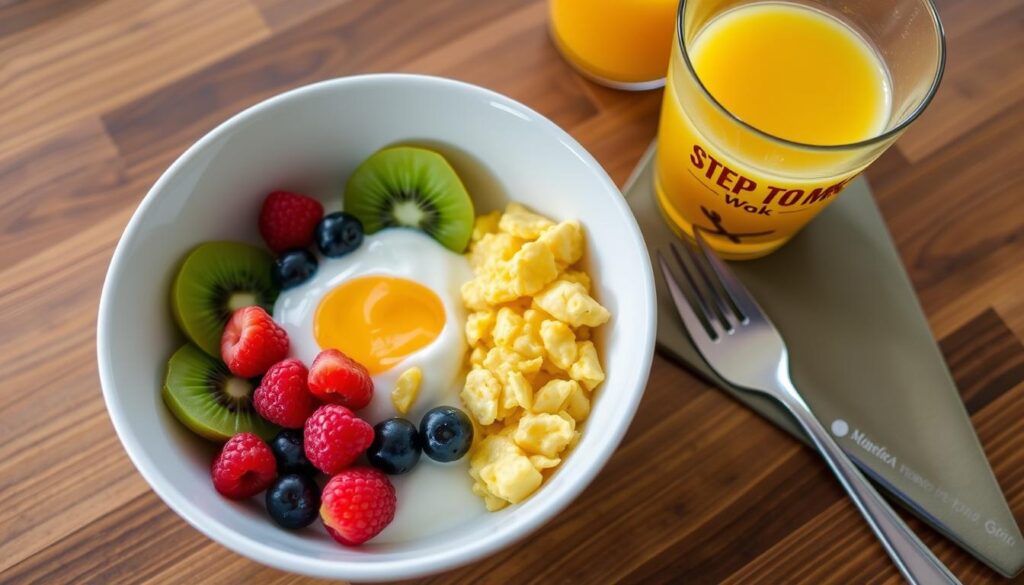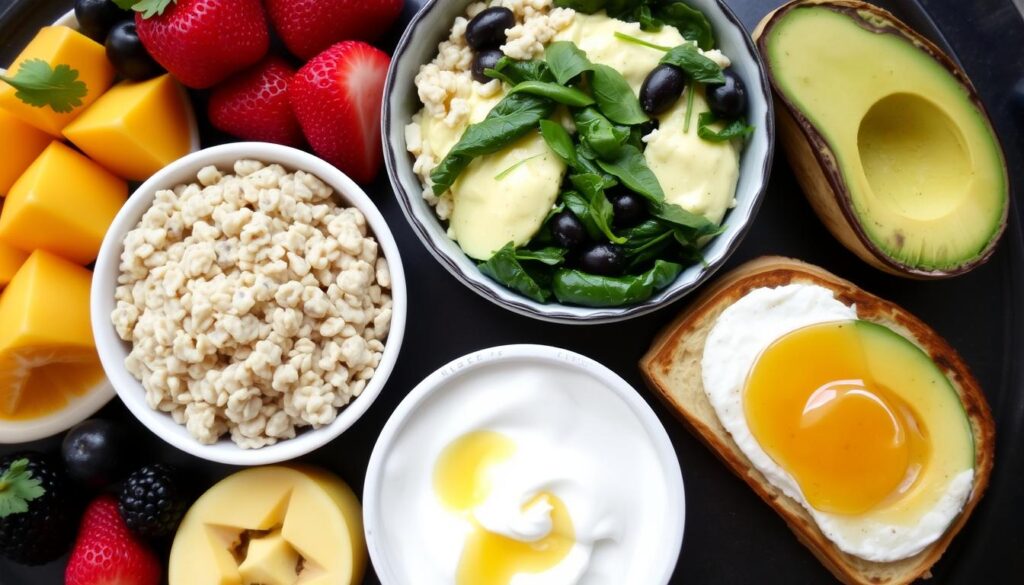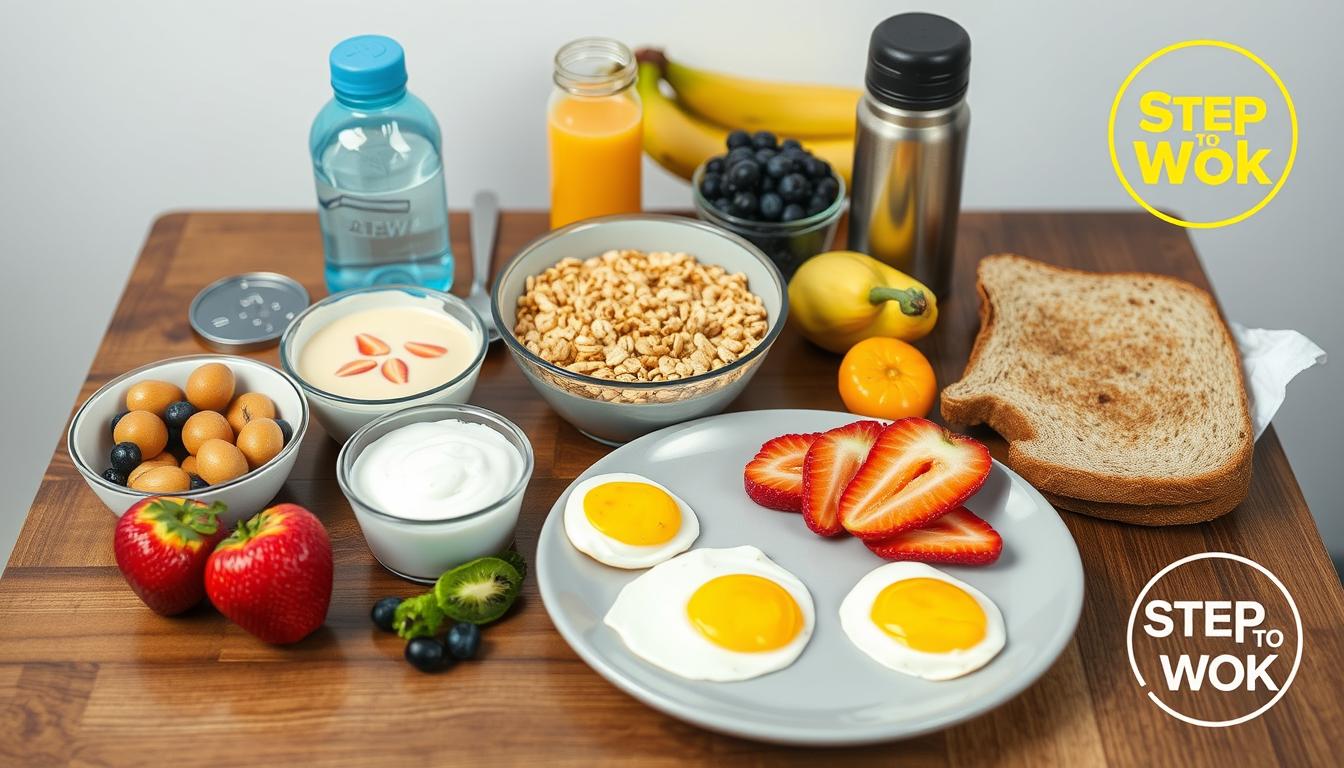Starting your day with a nutritious breakfast is key for athletes. It fuels your workout and boosts performance. With many options, picking the right one can be tough. A complete meal 90 minutes before a workout is best, giving your body time to digest.
A handful of cereal or granola is a good choice. It offers carbs, fiber, and protein. These are vital for quick energy and muscle repair.
Eating a banana before working out is also beneficial. It’s easy on the stomach and gives quick energy. This is important for pre-workout meals.
We’ll look at the best breakfasts for athletes. We’ll cover timing, essential nutrients, and tasty recipes. Our focus will be on meals that give you the energy and support you need for your workout.
Key Takeaways
- A nutritious athlete breakfast is essential for fueling workouts and maximizing performance.
- Eating a complete meal 90 minutes before a workout allows for proper digestion.
- Carbohydrates and protein are essential nutrients for pre-workout meals, providing energy and supporting muscle repair, making them a great fitness food option.
- A handful of cereal or granola can be an effective quick source of energy before workouts, a great option for pre-workout meals.
- Consuming a banana for breakfast can provide quick energy and is easy on the stomach, a great athlete breakfast option.
- Staying hydrated is important, and chocolate milk is a good choice after events. It’s full of nutrients, making it a great fitness food.
The Importance of Breakfast for Athletes
Athletes need a balanced diet to perform well, and breakfast is key. It gives them the nutrients they need, like carbs, proteins, and fats. These help fuel workouts and aid in muscle recovery. A good breakfast also boosts performance, cuts down on fatigue, and improves athletic skills.
Studies show that athletes who eat breakfast feel less tired and sluggish in the morning. This leads to better performance during workouts and games. Athletes should aim for a breakfast with protein, carbs, and healthy fats. Some energy-boosting recipes include overnight oats, breakfast casseroles, and egg dishes. These are packed with protein and help repair muscles.
Here are some key benefits of breakfast for athletes:
- Improved athletic performance
- Reduced fatigue and morning sluggishness
- Support for muscle recovery and repair
- Enhanced mental focus and function
For athletes seeking breakfast for athletes ideas, add whole grain carbs, lean proteins, and healthy fats to your meals. Some examples are:

- Whole grain toast with avocado and eggs
- Greek yogurt with berries and granola
- Smoothie bowl with banana, spinach, and almond milk
| Food | Benefits |
|---|---|
| Whole grain carbs | Sustained energy and fiber |
| Lean proteins | Muscle repair and maintenance |
| Healthy fats | Support for heart health and satisfaction |
Essential Nutrients for Pre-Workout Meals
When it comes to pre-workout breakfast, focus on the right nutrients. A good meal should have carbs, proteins, and fats. Carbs give you energy, while proteins help your muscles recover and grow.
Healthy fats, like nuts and seeds, are also key. They give you lasting energy and support your health. For a fitness morning meal, add complex carbs like whole grains, fruits, and veggies. Also, include lean proteins like eggs, Greek yogurt, or cottage cheese.
Carbohydrates: The Energy Source
Carbs are vital for workout energy. The International Society of Sports Nutrition (ISSN) says glycogen is key for intense exercise. A 2020 review found that carbs before exercise boost performance in long workouts.
Proteins: Supporting Muscle Recovery
Proteins are key for muscle recovery and growth. Pre-workout protein boosts muscle protein synthesis, helping build muscle. According to ISSN, eating protein before exercise increases muscle mass and recovery.

Fats: Understanding Healthy Fats
Healthy fats give you lasting energy and support health. A 2023 study showed that a high-fat meal keeps glycogen stores better than a high-carb meal. This highlights the role of fats in glycogen preservation.
- Include complex carbohydrates like whole grains, fruits, and vegetables
- Add lean proteins like eggs, Greek yogurt, or cottage cheese
- Incorporate healthy fats like nuts and seeds
By adding these nutrients to your pre-workout breakfast or fitness morning meal, you boost energy, support muscle recovery, and improve performance.
Best Breakfast Foods for Athletes
Athletes need a balanced breakfast to fuel their training and performance. A great athlete breakfast should have complex carbs, protein, and healthy fats. Foods like oatmeal, eggs, Greek yogurt, and smoothies are top choices.
These foods are packed with nutrients and easy to make. For instance, oatmeal can be made with milk or water and topped with fruit and nuts. Eggs can be scrambled, fried, or turned into an omelette. Greek yogurt can be mixed with berries and granola, and smoothies can blend yogurt, fruit, and spinach.
Here are some healthy breakfast ideas for athletes:
- Oatmeal with banana and almond butter
- Scrambled eggs with whole-grain toast and avocado
- Greek yogurt with berries and granola
- Smoothie bowl with spinach, banana, and almond milk topped with nuts and seeds
These breakfasts offer a mix of carbs, protein, and fats, perfect for athletes. Adding these foods to their diet helps support training and performance. It also aids in reaching fitness goals with the right fitness food.
| Food | Calories | Protein | Fat | Carbohydrates |
|---|---|---|---|---|
| Oatmeal with banana and almond butter | 400 | 10g | 20g | 60g |
| Scrambled eggs with whole-grain toast and avocado | 350 | 20g | 20g | 30g |
| Greek yogurt with berries and granola | 300 | 20g | 10g | 40g |
| Smoothie bowl with spinach, banana, and almond milk | 250 | 15g | 10g | 40g |
Timing Your Breakfast
Timing is key when it comes to pre-workout meals. Eating too soon before your workout can cause stomach issues. On the other hand, waiting too long can make you feel hungry and tired. For your fitness morning meals, try to eat a full meal about 90 minutes before your workout.
When to Eat: Before vs. After Workouts
The right time to digest pre-workout meals is important for good performance. A balanced meal with protein, carbs, and fats gives you energy for your workout.
- Eating a complete meal 90 minutes before a workout allows for proper digestion and can help prevent digestive discomfort during exercise.
- Eating too close to a workout can lead to poor performance and discomfort, while eating too far in advance can result in low energy levels.
By timing your fitness morning meals right, you get the energy and nutrients for a great workout. Don’t forget to drink water and listen to your body to find the best time for your pre-workout meals.
Tailoring Breakfast to Your Workout
Choosing the right breakfast is key for your workout. The type and length of your exercise affect what you need to eat. A good breakfast helps you perform better and stay healthy.
For light activities like yoga or a jog, you might not need as much food. But for intense exercises like weightlifting or sprinting, you’ll need more energy. The length of your workout also matters, so plan your breakfast carefully.
Light vs. Intense Workouts: What to Choose
For light workouts, a balanced meal is best. This meal should have carbs, protein, and healthy fats. Here are some examples:
- Oatmeal with fruit and nuts
- Whole-grain toast with avocado and eggs
- Greek yogurt with berries and honey
Duration of Your Training Session
For longer workouts, you’ll need more calories and nutrients. A breakfast with complex carbs, lean protein, and healthy fats is good. Here are some examples:
- Whole-grain cereal with milk and banana
- Scrambled eggs with whole-grain toast and turkey bacon
- Smoothie bowl with protein powder, spinach, and almond milk
| Workout Type | Breakfast Recommendations |
|---|---|
| Light Workout | Oatmeal with fruit and nuts, whole-grain toast with avocado and eggs |
| Intense Workout | Whole-grain cereal with milk and banana, scrambled eggs with whole-grain toast and turkey bacon |
Hydration and Breakfast
Staying hydrated is key for top health and fitness. Even a little dehydration can slow you down. When you eat breakfast, make sure to drink the right fluids too. This helps you stay hydrated and boosts your athletic performance.
Importance of Hydration Before Exercise
Drink 16-20 ounces of water or a sports drink 1-2 hours before working out. This is vital for athletes doing intense exercises. Dehydration can make you perform worse and increase injury risk.
Fluids to Pair with Your Breakfast
For energy-boosting recipes, choose the right drinks. Here are some good options:
- Water: the best for staying hydrated
- Sports drinks: great for intense workouts
- Coconut water: a natural source of electrolytes
Preparing Meals Ahead of Time
As an athlete, eating the right foods is key to better performance. Preparing meals in advance saves time and ensures you get the nutrients you need. A good pre-workout breakfast boosts your energy and performance.
Here are some tips for meal prep:
- Plan your meals and make a grocery list to get all the ingredients.
- Make different fitness food options like overnight oats, smoothies, and energy balls.
- Use containers with tight lids to keep your meals fresh.
Meal Prep Tips for Busy Athletes
Meal prepping is a big help for busy athletes. It saves time and makes sure you eat the right foods. Here are some tips to start:
Quick Breakfast Recipes to Try
Try these quick and easy breakfast recipes:
- Overnight oats with fruit and nuts
- Smoothies with protein powder and frozen fruit
- Energy balls made with oats, nuts, and dried fruit
Common Breakfast Mistakes to Avoid
When it comes to athlete breakfast and fitness morning meals, there are common mistakes to watch out for. Skipping breakfast can hurt your athletic performance. On the other hand, overeating can cause stomach discomfort and make it hard to perform well.
A balanced breakfast with carbs, proteins, and healthy fats is key for athletes. It’s also important to choose the right portion size for you. For instance, a study showed that eating eggs for breakfast made people feel fuller for longer than eating bagels.
Skipping Breakfast: Why It’s Not Advisable
Skipping breakfast can harm your athletic performance and health. It can make you feel tired, unfocused, and increase your injury risk. But, eating breakfast soon after waking can help you avoid feeling too hungry later and support weight control.
Overeating: Finding the Right Portion Size
Overeating is bad for your athletic performance and health. It can make you feel bloated, uncomfortable, and less energetic. To avoid this, it’s important to find the right portion size and eat with awareness. A good breakfast size for feeling full is around 300 to 400 calories.
When planning your athlete breakfast or fitness morning meal, keep these tips in mind:
- Eat a balanced breakfast with carbs, proteins, and healthy fats.
- Choose portion sizes that fit your needs.
- Avoid skipping breakfast and overeating.
- Eat breakfast within an hour of waking to prevent hunger later.
Supplements: Do Athletes Need Them?
Many athletes ask if pre-workout meals and fitness food need supplements. It’s important to check if you need supplements. A diet full of carbs, protein, and fats can give you all you need for top performance.
Eating a variety of foods is key. Include fruits, veggies, whole grains, lean proteins, and healthy fats. Sometimes, supplements can help if you can’t get enough nutrients from food. Always talk to a sports dietitian or doctor before adding supplements.
Safe supplements include protein powder, creatine, and BCAAs. They help with muscle recovery, boost energy, and improve performance. But, make sure to pick high-quality ones and follow the dosage.
In short, supplements can help athletes, but it’s vital to know your nutritional needs. A balanced diet and advice from a sports dietitian or doctor are the best ways to support your training and performance.
Local Breakfast Trends for Athletes
Athletes look to local breakfast trends for energy. They need meals that boost their morning workouts. It’s key to pick meals that are both tasty and nutritious.
Studies show that people who keep weight off eat breakfast every day. This is true for athletes too. They might enjoy oatmeal with fruit and nuts or Greek yogurt with granola.
Popular Breakfast Spots in the U.S.
In the U.S., many places serve healthy breakfasts for athletes. Some top spots include:
- Cafes with dishes like avocado toast and smoothie bowls
- Restaurants with healthy options like egg whites and whole-grain toast
- Health food stores with athlete-friendly foods like protein shakes and energy bars
Nutrition Hacks from Elite Athletes
Elite athletes share tips on how to fuel up. They suggest eating a big breakfast and snacks within an hour of waking. They also recommend quick breakfasts or meal prep to save time.
Conclusion: Fueling Your Morning for Success
As an athlete, eating a good pre-workout breakfast is key. It helps you perform better and feel better overall. This guide shows you how to make a breakfast that fits your needs and goals.
Being consistent is important for a good breakfast habit. Try different foods to see what works for you. Your taste buds and performance will improve.
Starting with a healthy breakfast sets you up for success. It gives you the nutrients and energy you need. A good morning routine can help you reach your best on and off the field.

